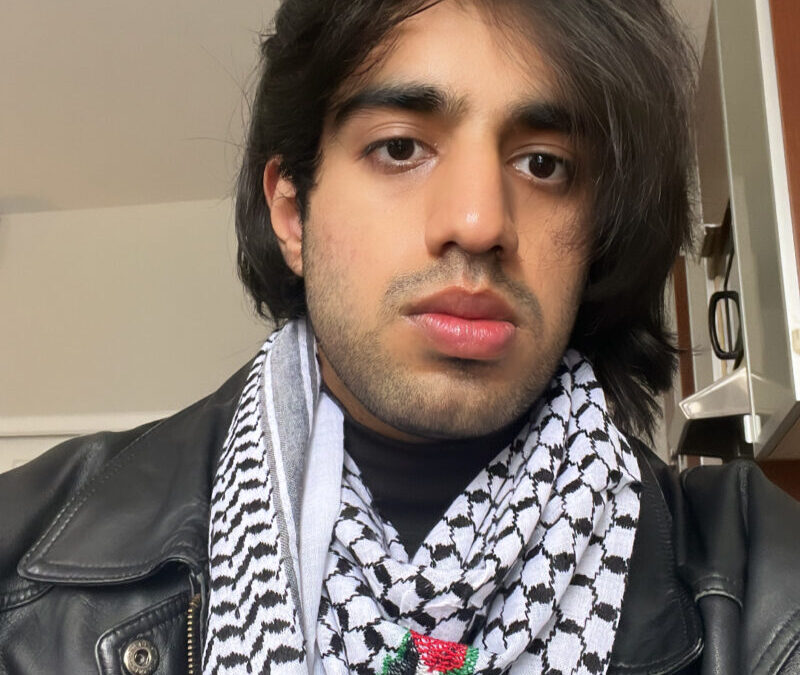Ali Imran, Staff Writer–
Palestinian filmmaker Muayad Alayan’s A House in Jerusalem (2023) screened on Thursday, February 4, 2024 in Herrick Hall, the first of four selections in this year’s MENA Film Festival. After losing her mother in a car accident, Rebecca (Miley Locke), a 10-year old Jewish-British girl, moves to Jerusalem with her father, Michael (Johnny Harris). The traumatic death seems to have strained their relationship and Michael hopes the move will help. However, Rebecca only becomes more attuned to what haunts her new house, including the ghost of a Palestinian child around her age, Rasha (Sheherazade Farrel). As a bond forms between Rebecca and Rasha, a series of events lead Rebecca to the house’s past, the Nakba, Israeli security apparatus, and West Bank.
Asked what inspired this project, Muayad Alayan, joining for a discussion from West Jerusalem, recounted the story of the neighborhood in West Jerusalem where the story is set, which used to be a Palestinian neighborhood until the 1948 Nakba (Alayan’s grandfather owned a butcher’s store there and his father would deliver meat and goods). Driving through the neighborhood, Alayan saw a family moving into a house that he remembers well from his father’s stories and imagined what it would be like for them to meet the ghosts of Palestinians displaced from their house. “The whole idea behind the ghosts of the living was inspired by the life of my late grandmother, mother, and late father … what inspired [Muayad and Rami Alayan] was what we witnessed growing up with our family when they were alive, it is very true to the collective experience of the Palestinian people.”
In response to the audience’s questions, Alayan shared the almost historiographic process in the making of the film. He interviewed Palestinians displaced from the neighborhood and met members of Zochrot, an Israeli human rights organization that disseminates information for Jewish Israelis on the Nakba and the Right of Return. The legendary Egyptian singer Asmahan’s stay in the neighborhood, the prominence of Palestinian embroidery or tatreez, the dog, Simon, left behind when Alayan’s grandmother was internally displaced, are only some of the few details woven into the narrative. In a way, the movie is haunted by these details. Alayan also shared that his grandmother, born in 1908, refused to go see what happened to her house for decades after 1948, it was simply too painful for her. When she was finally convinced in 1991, his family videotaped the event and “for days, months, years, everyone was obsessed with this tape.” Fascinated by this obsession, Alayan noted that “they felt that they got back a piece of the house and the land that was stolen from them by preserving the story on this videotape. It was so powerful and this is why I love what I am doing even though it is very painful to be a filmmaker … This idea and notion of holding on to certain memories and emotions and to preserve them on film is a very powerful thing.”
A House in Jerusalem produces powerful, uncanny effects as placid atmospheres are disrupted by Rebecca’s encounters with the fragmented reality of settler-colonialism and a repressed sociality starts to surface. Sociologist Avery Gordon writes that “the ghost is primarily a symptom of what is missing. It gives notice not only to itself but also what it represents … we are in relation to it and we must reckon with it … out of a concern for justice.” It is fitting then that the first installation in this year’s MENA Film festival is the story of a Palestinian haunting. On sanitized and surveilled college campuses, in heavily policed and millitarized public spheres, and within colonial bureaucracies of Capitol Hill and the ICJ, a haunting is taking place and demanding a reckoning. One can place Alayan’s movie within a powerful and radical trend of Palestinian artists and writers archiving Palestinian past and experience (in face of colonial erasure and genocide) that goes beyond just collecting and preserving. As historian Esmat Elhalby writes, these projects very much “expand our political imagination. Thawra hattal nasr.”

